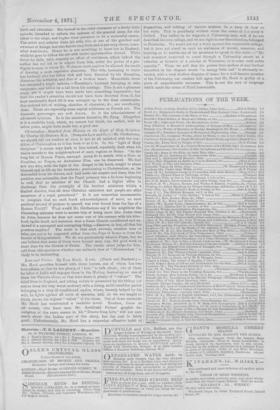Love and Valour. By Torn Hood. 8 vols. (Hurst and
Blaokett.)— Mr. Hood provides himself with throe heroes, one of whom ha o two love affaire, so that he has plenty of "love" to talk about ; two of them he takes to India and ong tges them in the Mutiny, bestowing on one of them the Victoria Cross, so that hero there is plenty of "valour." The third lives in England, and taking orders is presented by his bishop (of course from the very worst motives) with a living, an ill-cared for parish belonging to a very ill-conditioned squire, where, bravely helped by his wife, he fights against all sorts of enemies, and, as we are taught to think, shows the highest " valour " of the three. Oat of then materiala Mr. Hood has constructed a readable novel. Readers, those at all events, who have aeon Mr. Archibald Forbes' graphic de- scription of tho some scones in his " Drawn from Life," will not care much about the Indian part of the story, but the rest is fairly good. Unfortunately, Mr. Hood has a somewhat offensive habit Of dogmatism, and talking of various matters in a very do haat en boo style. This is peculiarly ovident when tho scene of tlle story is Oxford. The author is, we suppose, a University man, and if he seas described his own college, and we are right in our identification, belonged to Pembroke. We would not soy a word against this respectable college, but it does not stand on such an eminence of morals, manners, and learning as to entitle one of its members to speak in this style:—" He had somehow contrived to crawl through a University career as a tabordar at Quoon's or a scholar at Worcester, or in some such noblo capacity." When we add that the person thus spoken of and further described in the elegant words " a mangy little cad " is obviously in- tended, with a very shallow disguise of name, for it well-known member of the University, our readers will agree that Mr. Hoed is gailty of a piece of unpardonable rudoness. This is not the sort of language which made the name of Hood honourable.


































 Previous page
Previous page